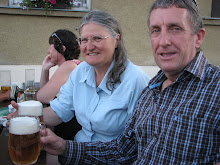The bus ride from Sayun in Yemen was pretty comfortable. Luckily we decided to take a sweatshirt as the air-conditioning was really cold. There were not many passengers on the bus so we could spread out. Lil was the only female travelling.
There was a reasonably full moon but there was not a lot to be seen in the gravel desert nor the sandy desert. We stopped a few times at the start of the journey, at every petrol station in fact, but they had no petrol. We pulled into a petrol station and about 20 metres from the bowser we ran out of fuel. All the men in the bus, about 15 , had to get out and push us up to the pump!
At the petrol pumps there were places to eat and a place to pray so the men got out to say their prayers. The trip eventually took us 14 hours and we had expected to take 18 so it was good to arrive early. Maybe this was because the roads were in really good condition all the way. We did read that wealthy Saudis and Omanis had contributed to paying fior the roads between Oman and Yemen.
We arrived at the border to Oman at 2am and had to buy an Omani visa. It didn't take long and cost about $24 NZ.
The hotel in Salalah was a new place and a short walk from the bus station through the souq. Immediately we could see a huge difference between Yemen and Oman. All the street and shop signs were in Arabic and English. The hotel was a two star (the cheapest in town) and felt like a four star. It was so comfortable it was hard to leave.
There was not a lot to do in Salalah but we walked around the new mosque that was having the final touches done to it. The streets are well laid out and very wide. Our hotel felt like it was in the middle of a building site there were so many new buildings in various stages of construction.
Salalah is famous for frankincense. It traded the tree resin since 5000 BC to Europe, India in exchange for spices, and to China. The tree bark is cut and the resin that oozes out is scrapped off and dried. The dried resin is then burnt on a charcoal burner as a perfume. Many shops still burn the frankincense.
There are many workers here from Bangladesh, India and the Philippines. We enjoyed a few Indian curries as a nice change from rice and beans.
We visited the Al-Baleed ruins and museum. It was a well organised and beautifully presented display of the history of the region and the story of shipping trade over the centuries. It lies beside ancient ruins taht are still being excavated. There was also a section on the former king, Said Bin Taimur, and under his rule the country was closed to foreigners. There were no secondary schools, two primary schools, two hospitals run by American Missions, and only 10 kilometres of sealed roads. His only son Qaboos Al Said took over in 1970 and had his father sent to London where he stayed for the rest of his days.
Qaboos appears in photos, carpet weavings and portraits. He has turned the country around and now it is very modern, organised and CLEAN. You can be fined for littering, the taxi driver told us. You can also be fined for having a dirty car. It is also pretty expensive. It doesn't have as much oil as the other countries surrounding it either. Qaboos had tried to encourage small businesses and education is free. We have seen businesses where women are at the front desk, but not many.
Businesses open at 7am and then close at 11am. Everyone goes for prayers and rests in the heat of the day to return to work at 4pm, trading until 8pm or even later. It is difficult to cross the streets at night as everyone is on the move. They love their modern air-conditioned cars. there is no public transport other than shared taxis. They have depots where they leave from and you stand on the side of the road and flag one down going your way. It picks up more people along the way. Of course there are taxis that you can hire to take you where ever you want as well.
Salalah is famous for its summer rains and drizzle called khareef . The people of Muscat come here to enjoy the cold wet days and picnic in the valleys that burst into green over this time.
We visited teh




